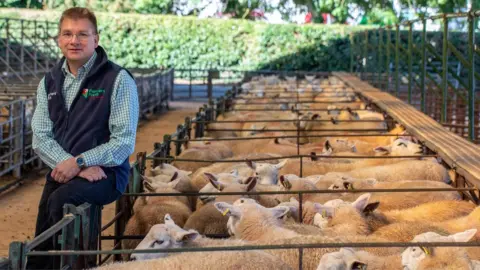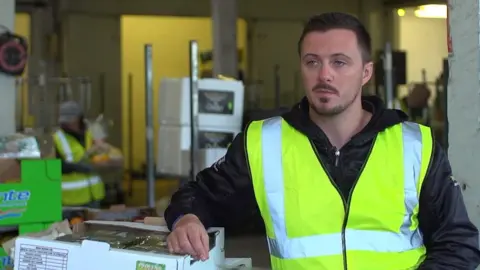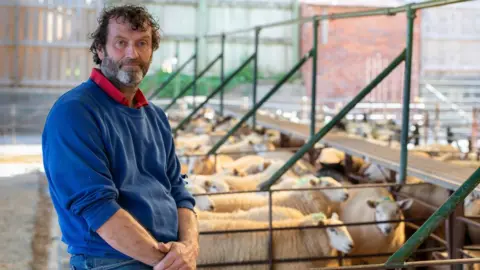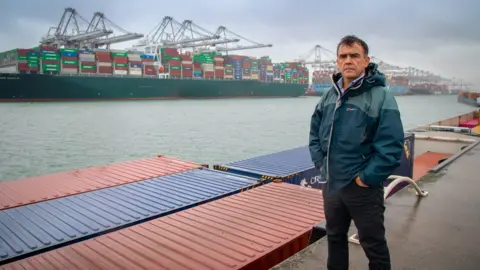Brexit: How will it affect the Welsh food industry?
Farmers and food importers in Wales say delays in finding a trade deal after Brexit could be devastating.
Even if Boris Johnson's current deal gets approved, there could still be years of negotiations to come.
And while Welsh produce is in demand across the world, experts say uncertainty could lead to customers looking elsewhere.
Even some remain voters in the food industry say they want the whole process over to protect jobs.
While the Brexit debate continues in Westminster, Welsh farmers, food importers and supermarket owners are carefully monitoring what a deal could mean for their industries.
The country sends 60% of its exports, such as lamb, to European Union countries, but also imports large quantities of food.
Currently fruit and vegetables arrive quickly and easily from the EU. That would not change during the Brexit transition period which is due to last until at least December 2020.
But it is the uncertainly about what happens after that which concerns Welsh importers and producers.
BBC Wales Investigates has spoken to people from across the food industry to get their views on what should happen next.
 Tim Jones/BBC
Tim Jones/BBCHow will Brexit affect Welsh exports?
Meat exporter Mike Gooding buys thousands of lambs from across Wales every week to sell into 12 EU countries. He is well aware of the interest in UK food, and the potential pitfalls of the current political stalemate.
"Currently we have the ability to trade around the world under our EU membership. If we Brexit or when we Brexit we have to renegotiate as our own country and that is a process that takes time," he said.
"I think as a UK industry we have to wake up to the fact that we are in a serious game. It's not just a case of turning up and saying 'here's our product, don't you want it?' because the answer is 'well I've got lots of other [offers]'."
"The best scenario that we could hope for and what we should be fighting for is one where we can sort out our political issues but keep our trading arrangements going."

What will happen to food supplies after Brexit?
Matthew Hunt runs Filco Supermarkets, an independent chain of shops which started in the front room of a house in the Vale of Glamorgan in 1946. He now oversees 13 shops which employ hundreds of people across south Wales.
He is currently able to get fresh food from Europe onto the shelves of his shops quickly. A prospective increase in tariffs, even if the UK gets a new deal, has him worried.
"There is a threat," he said. "We operate on fine margins so any increase in that [tariffs] is going to put us under added threat.
"If our competition is able to withstand the pressure of cost rises our consumers would likely shop with them rather than us."
Mr Hunt buys fruit and vegetables from wholesalers like Phillip Jones, whose family business near Pontypool imports them from Europe, much of it through the Netherlands.
Mr Jones can order salads from Dutch suppliers and have them ready to send out to shops within 24 hours. He and his son Alex both voted remain, but are worried about the future of their business as the political stalemate continues.
Alex Jones said: "My message to the politicians and the government would be to stop bickering and stand behind each other and get on with it and get something done for the good of the country."
 Tim Jones/BBC
Tim Jones/BBC'Worst uncertainty since foot and mouth'
And while the importers are not sure how they will continue to supply Wales with food after Brexit, those who rely on selling to Europe have their own concerns.
Jeff Gwillim's family have farmed in the Black Mountains near Talgarth, Powys, since the 1700s. Most of his 1,000 lambs are destined for the EU.
Having voted leave in the 2016 referendum because of EU regulations, Jeff still wants out - but with a trade deal.
Like many Welsh farmers he fears the possibility of 40% tariffs on his animals in a no-deal scenario.
That prospect has receded for now, but he can still see trouble ahead and is selling more sheep than normal at the moment, fearful of a drop in price.
"The export markets are vital for the whole industry," he said. "Things are more uncertain than it's ever been. The only thing I can come close to with uncertainty was foot and mouth.
"The worst case scenario is that the market collapses. They end up left on a farm. If the weather gets too bad we could end up with sheep starving which is really something we don't want to see."
 Tim Jones/BBC
Tim Jones/BBCCould Brexit offer new opportunities?
Economist Edward Jones from Bangor University says there could be new opportunities on the horizon if Brexit is finalised, but he also has a warning for consumers.
"One of the advantages that we will have from leaving the EU is that we will have control over the tariffs that we set," said Dr Jones.
"It's up to the government to decide what tariffs to set in order to encourage imports or the products that we need here.
"The government has said that they expect food prices to increase by 10% under their Brexit scenarios, but given how we have seen sterling fall in value over the last few months, I would expect food prices to increase by 15% if we do not get a trade deal with the European Union."
BBC Wales Investigates Brexit: Food for Thought is on Monday 28 October at 20:30 GMT on BBC One Wales and on the BBC iPlayer.
